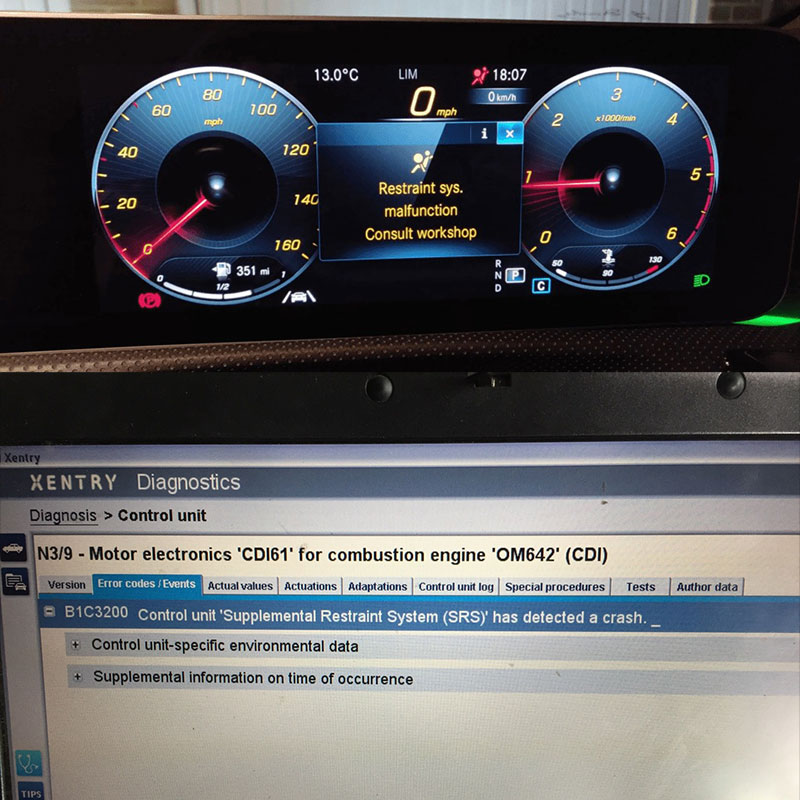
What Does Audi Code E0A Really Mean?
Table of Content
- 1. Understanding Audi Option Codes
- 1.1. What are VAG Option Codes?
- 1.2. Where to Find Your Audi’s Option Codes
- 1.3. Decoding Option Codes
- 1.4. Why Option Codes Matter for Technicians
- 2. Audi Code E0A: No Special Edition Explained
- 2.1. What Does “No Special Edition” Mean?
- 2.2. Implications for Vehicle Configuration
- 2.3. How E0A Affects Diagnostics and Repairs
- 3. Common Audi Option Codes and Their Meanings
- 3.1. Key Option Codes
- 3.2. Understanding Specific Option Codes
- 3.3. Using Option Codes for Part Identification
- 4. Diagnosing Audi Electrical Issues
- 4.1. Common Electrical Problems in Audis
- 4.2. Importance of Accurate Diagnostics
- 4.3. Tools and Equipment for Electrical Diagnostics
- 4.4. Step-by-Step Diagnostic Process
- 5. ECU, TCM, BCM, ABS, and AdBlue Systems Explained
- 5.1. ECU (Engine Control Unit)
- 5.2. TCM (Transmission Control Module)
- 5.3. BCM (Body Control Module)
- 5.4. ABS (Anti-lock Braking System)
- 5.5. AdBlue System
- 6. Software Updates and Navigation Updates for Audi Vehicles
- 6.1. Importance of Software Updates
- 6.2. How to Perform Navigation Updates
- 6.3. Benefits of Regular Updates
- 7. Key Programming for Audi Vehicles
- 7.1. When is Key Programming Needed?
- 7.2. Tools and Software for Key Programming
- 7.3. Step-by-Step Key Programming Process
- 8. AutoExplain.com: Your Partner in Audi Diagnostics and Repair
- 8.1. Remote Diagnostic Services
- 8.2. Benefits of Remote Support
- 8.3. How AutoExplain.com Can Help with Complex Issues
- 9. Troubleshooting Common Audi Error Codes
- 9.1. Identifying Error Codes
- 9.2. Common Error Codes and Their Solutions
- 9.3. When to Seek Professional Help
- 10. Staying Updated with the Latest Audi Technology
- 10.1. Importance of Continuous Learning
- 10.2. Resources for Staying Informed
- 10.3. How AutoExplain.com Supports Ongoing Education
- 11. The Importance of E-E-A-T and YMYL in Automotive Repair Content
- 11.1. Understanding E-E-A-T
- 11.2. YMYL Considerations in Automotive Repair
- 11.3. How AutoExplain.com Ensures High-Quality Content
- 12. Optimizing Automotive Repair Content for Google Discovery
- 12.1. Creating Engaging Headlines and Meta Descriptions
- 12.2. Using High-Quality Images and Videos
- 12.3. Structuring Content for Readability
- 12.4. Addressing User Intent
- 13. FAQ About Audi Error Codes and Diagnostics
- 13.1. What is an Audi option code?
- 13.2. Where can I find my Audi’s option codes?
- 13.3. How can I decode Audi option codes?
- 13.4. What does Audi code E0A mean?
- 13.5. What are common electrical problems in Audis?
- 13.6. What tools are needed for diagnosing Audi electrical issues?
- 13.7. Why is key programming necessary for Audi vehicles?
- 13.8. How can AutoExplain.com help with Audi diagnostics?
- 13.9. How often should I update my Audi’s software?
- 13.10. Where can I find reliable information about Audi repair?
Decoding Audi option codes can unlock valuable information about your vehicle’s original factory specifications. Audi Code E0a signifies no special edition for the vehicle. This seemingly simple designation can be crucial for technicians diagnosing and repairing Audi vehicles, ensuring they understand the base configuration before tackling any modifications or issues. Dive deeper to understand the importance of factory option codes and how AutoExplain.com can help you navigate complex Audi repairs with expert remote support, comprehensive navigation updates, and precise key programming.
1. Understanding Audi Option Codes
Audi option codes, like E0A, are alphanumeric designations that reveal specific details about how a vehicle was originally manufactured. These codes are usually found on a sticker in the service booklet or elsewhere in the car.
1.1. What are VAG Option Codes?
VAG option codes refer to the configuration codes used by Volkswagen Audi Group (VAG) to specify features and equipment installed in their vehicles at the factory. These codes help identify the precise build specifications of a car.
1.2. Where to Find Your Audi’s Option Codes
You can typically find these codes on a sticker located in the service booklet, the spare tire well, or on the vehicle’s build sticker.
1.3. Decoding Option Codes
Decoding these codes can be done using online decoders, providing a detailed list of the car’s original factory specifications. One such tool is available at http://igorweb.org/equidec/Default.aspx. Keep in mind that no tool is 100% accurate, but they provide reliable insights.
1.4. Why Option Codes Matter for Technicians
Understanding option codes can greatly assist technicians in diagnosing issues, ordering the correct parts, and ensuring proper repairs. Knowing the original configuration helps avoid misdiagnoses and compatibility problems.
2. Audi Code E0A: No Special Edition Explained
Audi Code E0a specifically means “No special edition.” This indicates that the vehicle was produced without any additional or unique features beyond the standard factory configuration.
2.1. What Does “No Special Edition” Mean?
“No special edition” means the vehicle doesn’t include any exclusive packages, trims, or features that differentiate it from the base model. It’s a standard version without added extras.
2.2. Implications for Vehicle Configuration
This designation helps technicians understand that they are dealing with a standard configuration, which can simplify the diagnostic process. It confirms that no unique or unusual components are present due to a special edition package.
2.3. How E0A Affects Diagnostics and Repairs
When E0A is present, technicians can rely on standard repair procedures and parts catalogs. It rules out the complexities that might arise from special edition components, making the repair process more straightforward.
3. Common Audi Option Codes and Their Meanings
Besides E0A, many other Audi option codes provide essential information about the vehicle. Here are a few common ones:
3.1. Key Option Codes
-
7A2: CD changer
-
4UF: Airbags for driver and front passenger with front passenger airbag deactivation
-
6XD: Electrically adjustable/heated exterior mirrors
-
1KY: Rear disc brakes
-
1LP: Front disc brakes
3.2. Understanding Specific Option Codes
Each code corresponds to a specific feature or component. For example, knowing that a vehicle has “7A2” means it was originally equipped with a CD changer, which can be relevant when troubleshooting audio system issues.
3.3. Using Option Codes for Part Identification
Option codes are invaluable when identifying the correct replacement parts. They ensure that the new components match the original factory specifications, preventing compatibility issues.
4. Diagnosing Audi Electrical Issues
Modern Audi vehicles are equipped with complex electrical systems. Diagnosing issues requires a systematic approach and specialized knowledge.
4.1. Common Electrical Problems in Audis
Common issues include problems with the ECU, TCM, BCM, ABS, and AdBlue systems. These systems control various aspects of the vehicle, from engine management to braking and emissions.
4.2. Importance of Accurate Diagnostics
Accurate diagnostics are crucial for identifying the root cause of electrical problems. Incorrect diagnoses can lead to unnecessary repairs and wasted time.
4.3. Tools and Equipment for Electrical Diagnostics
Technicians need access to diagnostic tools such as scan tools, multimeters, and oscilloscopes to effectively diagnose electrical issues. Software and wiring diagrams are also essential.
4.4. Step-by-Step Diagnostic Process
-
Initial Scan: Perform an initial scan to identify any stored fault codes.
-
Code Analysis: Analyze the fault codes to understand the potential issues.
-
Visual Inspection: Conduct a visual inspection to check for obvious signs of damage or wear.
-
Component Testing: Test individual components using diagnostic tools to verify their functionality.
-
Wiring Checks: Inspect wiring harnesses and connectors for continuity and shorts.
-
System Verification: After repairs, verify the system’s functionality to ensure the issue is resolved.
5. ECU, TCM, BCM, ABS, and AdBlue Systems Explained
Understanding these key systems is vital for effective Audi repair.
5.1. ECU (Engine Control Unit)
The ECU controls the engine’s operation, including fuel injection, ignition timing, and emissions control. It relies on inputs from various sensors to optimize performance.
5.2. TCM (Transmission Control Module)
The TCM manages the automatic transmission, controlling gear shifts and ensuring smooth operation. It communicates with the ECU to coordinate engine and transmission functions.
5.3. BCM (Body Control Module)
The BCM controls various body functions, such as lighting, power windows, and door locks. It integrates these functions into a centralized control system.
5.4. ABS (Anti-lock Braking System)
The ABS prevents wheel lockup during braking, improving vehicle stability and control. It uses sensors to monitor wheel speed and adjust brake pressure accordingly.
5.5. AdBlue System
The AdBlue system reduces NOx emissions in diesel vehicles by injecting a urea-based solution into the exhaust stream. It is crucial for meeting emission standards.
6. Software Updates and Navigation Updates for Audi Vehicles
Keeping the software in Audi vehicles up to date is essential for optimal performance and security.
6.1. Importance of Software Updates
Software updates can improve system performance, fix bugs, and add new features. They ensure that the vehicle’s electronic systems are running efficiently.
6.2. How to Perform Navigation Updates
Navigation updates ensure that the navigation system has the latest maps and points of interest. This can be done via USB, online downloads, or through a dealership.
6.3. Benefits of Regular Updates
Regular updates can improve fuel efficiency, enhance system stability, and provide access to new features, ensuring a better driving experience.
7. Key Programming for Audi Vehicles
Key programming is necessary when replacing lost or damaged keys or adding new keys to the vehicle.
7.1. When is Key Programming Needed?
Key programming is needed when a key is lost, damaged, or when adding a new key. It ensures that the key is recognized by the vehicle’s immobilizer system.
7.2. Tools and Software for Key Programming
Key programming requires specialized tools and software that can communicate with the vehicle’s immobilizer system. These tools are essential for securely programming new keys.
7.3. Step-by-Step Key Programming Process
-
Connect Diagnostic Tool: Connect the diagnostic tool to the vehicle’s OBD-II port.
-
Access Immobilizer System: Access the immobilizer system using the diagnostic tool.
-
Enter Security Code: Enter the security code or PIN required to program the key.
-
Program New Key: Follow the on-screen instructions to program the new key.
-
Verify Functionality: Verify that the new key functions correctly, including starting the engine and operating remote functions.
8. AutoExplain.com: Your Partner in Audi Diagnostics and Repair
AutoExplain.com offers remote diagnostic services to help technicians quickly and accurately diagnose Audi issues.
8.1. Remote Diagnostic Services
AutoExplain.com provides remote diagnostic assistance, allowing technicians to connect with experienced professionals who can guide them through the diagnostic process.
8.2. Benefits of Remote Support
Remote support saves time, reduces costs, and provides access to specialized knowledge, ensuring efficient and accurate repairs.
8.3. How AutoExplain.com Can Help with Complex Issues
AutoExplain.com’s team of experts can assist with diagnosing complex electrical issues, software updates, key programming, and more, providing comprehensive support for Audi repairs.
9. Troubleshooting Common Audi Error Codes
Addressing error codes promptly can prevent further damage and ensure vehicle reliability.
9.1. Identifying Error Codes
Use a diagnostic scan tool to identify any stored error codes in the vehicle’s systems.
9.2. Common Error Codes and Their Solutions
Here are some common Audi error codes and their potential solutions:
| Error Code | Description | Possible Solutions |
|---|---|---|
| P0171 | System Too Lean (Bank 1) | Check for vacuum leaks, faulty MAF sensor, or fuel delivery issues. |
| P0300 | Random/Multiple Cylinder Misfire Detected | Check spark plugs, ignition coils, fuel injectors, and compression. |
| P0420 | Catalyst System Efficiency Below Threshold | Check for exhaust leaks, faulty oxygen sensors, or a failing catalytic converter. |
| P0401 | Insufficient EGR Flow | Check for a clogged EGR valve, faulty EGR solenoid, or vacuum leaks in the EGR system. |
| U0100 | Lost Communication With ECM/PCM | Check for wiring issues, faulty ECM/PCM, or issues with the CAN bus network. |
| B100B29 | Control Module System Software Invalid | Software incompatibility. Update ECU software. |
| E0A | No Special Edition | Not an Error code, but a configuration setting. No action needed as long as configuration is correct |
| P1640 | Solenoid Valve for Hydraulic Pump | Check the connection or the hydraulic pump system. |
| B1324-16 | Coolant shut-off valve | Check the electrical wiring, replace the valve |
9.3. When to Seek Professional Help
If you are unsure about how to diagnose or repair an error code, seek assistance from a qualified technician or AutoExplain.com’s remote support services.
10. Staying Updated with the Latest Audi Technology
Keeping up with the latest Audi technology is crucial for providing effective repair services.
10.1. Importance of Continuous Learning
The automotive industry is constantly evolving, so continuous learning is essential for technicians to stay current with new technologies and repair techniques.
10.2. Resources for Staying Informed
Attend training courses, read industry publications, and participate in online forums to stay informed about the latest developments in Audi technology.
10.3. How AutoExplain.com Supports Ongoing Education
AutoExplain.com offers training resources and expert support to help technicians expand their knowledge and skills, ensuring they can tackle even the most challenging Audi repairs.
11. The Importance of E-E-A-T and YMYL in Automotive Repair Content
When providing automotive repair information, it’s essential to adhere to the E-E-A-T (Experience, Expertise, Authoritativeness, and Trustworthiness) and YMYL (Your Money or Your Life) principles.
11.1. Understanding E-E-A-T
E-E-A-T ensures that the content is created by knowledgeable experts with hands-on experience, recognized authority, and a trustworthy reputation.
11.2. YMYL Considerations in Automotive Repair
Automotive repair falls under YMYL because incorrect information can impact vehicle safety and financial well-being. Accurate and reliable content is crucial.
11.3. How AutoExplain.com Ensures High-Quality Content
AutoExplain.com ensures high-quality content by employing experienced technicians, providing accurate information, and maintaining a trustworthy reputation in the automotive repair industry.
12. Optimizing Automotive Repair Content for Google Discovery
To ensure your content reaches a wide audience on Google Discovery, it must be engaging, informative, and optimized for search.
12.1. Creating Engaging Headlines and Meta Descriptions
Use compelling headlines and meta descriptions that accurately reflect the content and encourage users to click.
12.2. Using High-Quality Images and Videos
Incorporate high-quality images and videos to visually enhance the content and make it more appealing to users.
12.3. Structuring Content for Readability
Use clear headings, subheadings, and bullet points to structure the content for easy readability and comprehension.
12.4. Addressing User Intent
Ensure the content directly addresses the user’s search intent, providing valuable information and solutions to their problems.
13. FAQ About Audi Error Codes and Diagnostics
Here are some frequently asked questions about Audi error codes and diagnostics:
13.1. What is an Audi option code?
An Audi option code is an alphanumeric code that specifies the features and equipment installed in the vehicle at the factory.
13.2. Where can I find my Audi’s option codes?
You can find the option codes on a sticker in the service booklet, spare tire well, or on the vehicle’s build sticker.
13.3. How can I decode Audi option codes?
Use an online decoder tool, such as the one at http://igorweb.org/equidec/Default.aspx, to decode the option codes.
13.4. What does Audi code E0A mean?
Audi code E0A means “No special edition,” indicating the vehicle was built without any special or unique features beyond the standard configuration.
13.5. What are common electrical problems in Audis?
Common electrical problems include issues with the ECU, TCM, BCM, ABS, and AdBlue systems.
13.6. What tools are needed for diagnosing Audi electrical issues?
Diagnostic tools such as scan tools, multimeters, and oscilloscopes are needed for diagnosing electrical issues.
13.7. Why is key programming necessary for Audi vehicles?
Key programming is necessary when replacing lost or damaged keys or adding new keys to the vehicle.
13.8. How can AutoExplain.com help with Audi diagnostics?
AutoExplain.com offers remote diagnostic services, providing expert assistance and guidance to technicians for efficient and accurate repairs.
13.9. How often should I update my Audi’s software?
Regular software updates are recommended to improve system performance, fix bugs, and add new features.
13.10. Where can I find reliable information about Audi repair?
Reliable information can be found in industry publications, training courses, online forums, and through expert support services like AutoExplain.com.
Navigating Audi’s complex systems doesn’t have to be a solo mission. Whether it’s decoding a simple option like Audi code E0A or troubleshooting a complex electrical issue, AutoExplain.com is here to help.
Ready to experience expert support? Contact AutoExplain.com today via WhatsApp at (+84)967469410 or email at AutoExplain[email protected]. Visit our website at AutoExplain.com for more information and let our experienced team guide you to efficient and effective solutions. Our office is located at 1500 N Grant ST Sten Denver, CO 80203.

65535 Audi Fault Code: Expert Solutions and Fixes
Audi A3 Trouble Code 00796: Diagnosis, Solutions, and Expert Insights
Audi DTC 16347:014 – Expert Diagnosis and Solutions

Josh William
Josh William is a seasoned automotive expert and technical writer at AutoExplain. With a background as an automotive technician, he brings hands-on experience and deep industry knowledge to his writing.



